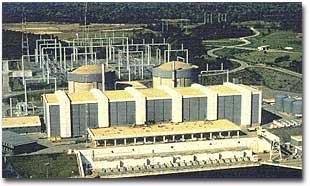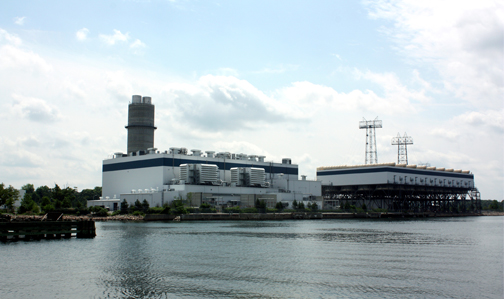
Exelon personnel in March noticed that new monitors installed five months earlier on the main steam line required recalculated thresholds for different levels of emergency. Exelon notified the NRC and fixed the problem.
“Nuclear power plant operators are always expected to err on the side of caution,” said David Lew, acting NRC Region I administrator. “But this is a case where an emergency declaration could have been made prematurely, triggering unnecessary responses.” The NRC credited Exelon with repairing the problem but criticized the company for allowing it to go unnoticed for five months.
Exelon argued that the mistake should have been classified a “green,” or very low safety, issue. The NRC determined that it was a more serious “white” issue, and it will step up oversight.
More: NRC
Wellinghoff Says Microgrids Key to Protecting System from Attacks

A system of microgrids would protect the bulk power system from calamity in the event of a physical or cyber attack, former Federal Energy Regulatory Commission Chairman Jon Wellinghoff told the GreenBiz Group’s VERGE conference last week.
“From everything I have seen, our grid is in really miserable condition from the standpoint of physical security overall,” Wellinghoff said. The answer is to diversify the system with microgrids, “so if they take down one node, it’s not going to cascade,” he said.
“Microgrids ultimately are where we need to move, to a distributed type of system, if we are ever to put out a defensible system that, in fact, can be sufficiently secure to provide us the level of reliability we all need for our businesses and homes,” Wellinghoff said.
More: GreenBiz
FERC Issues Prelim OK to Calpine-Fore River Sale

The agency ruled that the sale is “consistent with the public interest,” but it set a number of conditions, such as retaining FERC’s authority over rates and other costs. The conditional approval means that the commission sees no market power issues with the sale.
Calpine announced in August that it was purchasing Exelon’s 809-MW power station in North Weymouth, Mass. The deal, expected to close by the end of the year, would make Calpine the eighth-largest generator in New England, up from 13th.
More: energybiz
Constitution Pipeline Impact Study Released by FERC, Gets OK
The Federal Energy Regulatory Commission released the final environmental impact study for the proposed Constitution Pipeline to run 124 miles from Pennsylvania’s shale-gas fields to New York. The 30-inch pipeline would have “some adverse environmental impacts,” but the impacts would be mitigated if the pipeline company sticks to its plans and FERC’s recommendations, the study said.
Final FERC approval in the form of a certificate of public convenience and necessity, and other state and local approvals, are expected next year. The pipeline is designed to carry 650 million cubic feet of gas a day to Northeastern markets. It is a joint venture among Williams Co., Cabot Oil & Gas, Piedmont Natural Gas and WGL Holdings.
More: Independent Weekender
Atlantic Coast Pipeline Files to Start FERC Approval Process
Dominion on Friday asked the Federal Energy Regulatory Commission for permission to start the pre-filing process for its 550-mile Atlantic Coast Pipeline to deliver natural gas from Appalachian shale-gas fields to North Carolina.
The four companies that want to build the $4.5 billion to $5 billion pipeline — Dominion, Duke Energy, Piedmont Natural Gas and AGL Resources — say it is needed to meet demand, especially from proposed natural gas-fired power plants. They point to a more than 450% increase in demand for gas-fired generation in North Carolina between 2008 and 2013 and a 123% increase in Virginia.
Pre-filing with FERC starts a process of government and public input, as well as initiating the numerous studies the project will need. The proposed pipeline would run from West Virginia, through Virginia and into North Carolina. Dominion said it expects to get all approvals by 2016 and complete construction in 2018.
More: Pittsburgh Post-Gazette
DOE’s Rules Take Longest to Get White House Review
The White House Office of Management and Budget takes nearly seven weeks longer to review new rules from the Department of Energy than those of any other federal agency, according to a Bloomberg BNA study.
On average, the reviews by OMB’s Office of Information and Regulatory Affairs (OIRA) of Energy Department proposals take 154 days. Ahead of it is the Pension Benefit Guaranty Corp., with an average of 109 days, with the Department of Labor coming in at 107 days.
“These long delays in rules are important in terms of improving public protection,” said Ronald White, director of regulatory policy for the Center for Effective Government, a nonprofit group that was previously called OMB Watch. “It delays the benefits, and in a lot of cases we also know that OIRA reviews weaken the rules from what the agencies propose.”
The agency offered no explanation why the Energy Department rules take more time. “Our goal is to maximize the effectiveness and benefit of the rules we complete,” it told Bloomberg. “We have made it a priority to complete reviews in a timely manner.”
More: Bloomberg News
5 Companies to Get $13 Million to Develop Advanced Reactors
The Department of Energy is distributing $13 million to five companies to help them design, construct and operate advanced nuclear reactors. The awards are part of the Obama Administration’s Climate Action Plan and a DOE program started last year.
The cost-sharing grants to address technical challenges for next-generation nuclear reactors were awarded to:
- REVA Federal Services, working on liquid metal-cooled reactors.
- GE Hitachi Nuclear Energy, working on risk assessment practices.
- General Atomics, building and testing complex silicon carbide structures.
- NGNP Industry Alliance, investigating gas reactor post-accident heat removal.
- Westinghouse Electric, developing thermo-acoustic sensors for sodium-cooled fast reactors.
More: Power
FERC Upholds Progress, Duke Energy Merger
Two years after the merger of Progress Energy and Duke Energy, the Federal Energy Regulatory Commission issued its final decision on the transaction. It also threw out all remaining rehearing requests.
The two companies had filed for reconsideration some of the conditions FERC set for the merger, saying they were too restrictive. The commission also denied petitions from a number of organizations — including the town of New Bern, N.C., and the Florida Municipal Power Agency — that said the commission had been too easy on Duke and Progress.
More: News & Observer
Climate Change Protestors Blockade FERC HQ, 25 Arrested

Nearly 100 climate change protestors blockaded the headquarters of the Federal Energy Regulatory Commission yesterday, snarling traffic on First St. N.E. About 25 protesters were arrested. Among those participating were marchers who arrived in Washington following a cross-country walk from Los Angeles.
The protestors cited a variety of climate-related and environmental issues, including FERC’s approval of the Cove Point LNG project in Maryland.
More: EcoWatch


